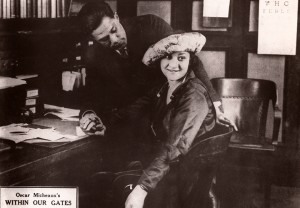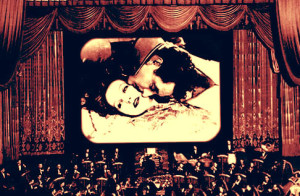 The Attucks Theatre event will feature a screening of Oscar Micheaux’s classic silent film, Within Our Gates (1920), accompanied by a live performance of a contemporary film score written by Dr. Adolphus Hailstork.
The Attucks Theatre event will feature a screening of Oscar Micheaux’s classic silent film, Within Our Gates (1920), accompanied by a live performance of a contemporary film score written by Dr. Adolphus Hailstork.
The 75 minute commissioned piece will be performed by the Harlem Quartet and guests violist Jennifer Arnold, cellist Jocelyn Demita Butler, and double bassist, Eric L. Thompson, III, as well as for members of the I. Sherman Greene Chorale. The score will be conducted by Michael Morgan, lead conductor of Oakland East Bay Symphony. There will be a second performance held on Monday, September 21 at Chandler Recital Hall in the Diehn Performing Arts Building at Old Dominion University accompanied by a discussion with Hailstork.
Within our Gates was directed by Micheaux as a purposeful response to D.W. Griffith’s Birth of a Nation (1915), even drawing its title from a line from the film. Overlooked during his time, Micheaux is now considered an important auteur and pioneer within Black cinema.
Hailstork is a renowned contemporary classical composer whose work blends African American and European styles in order to reinscibe Black historical experiences onto the American cultural canvas. Hailstork’s composition will serve as a link between past and present, helping audiences to draw affective and thematic connections between Micheaux’s work, current creative endeavors and Black cultural experiences.

Asked to describe his thoughts on Within our Gates and the film score he was composing, Hailstork says,
“The more I work on this project, the more I appreciate the skill of Michaux’s work. I find the cinematic language rich and compelling. I think WITHIN OUR GATES is masterful and filled with several themes and references which still echo in our own time.
The main subject of the film is the need and effort to educate the children of poor Blacks in the south. The heroine, Sylvia, is the character who moves from north to south and back carrying that message and those hopes. She does succeed in raising the funds for the school, while dealing with numerous amorous advances (one actually abusive), before finding the love of her life. My musical material is a “Sylvia theme” which serves as the primary binding ingredient.
The Micheaux “tableau- style” of film making provides a clear guide, musically, to mood and depiction of action. To avoid “cookie-cutter” stop- this, start- that solutions I, sometimes overlap the mood of the preceding section with the introduction of the new scene. At times, Micheaux juxtaposes various thoughts (for instance while Sylvia is receiving the good news from the philanthropist, she (Sylvia) is deep in her own thoughts about talks with Dr. Vivian, the man with whom she is falling in love). The music I am working on intersperses the love-interest theme with the Deep-South yearning spiritual so the music can represent the complexity of Micheaux’s structure.”
The performance is part of the 2015-16 F. Ludwig Diehn Concert Series. An Endowment established at the Hampton Roads Community Foundation, made possible by a generous gift from F. Ludwig Diehn, funds this program.